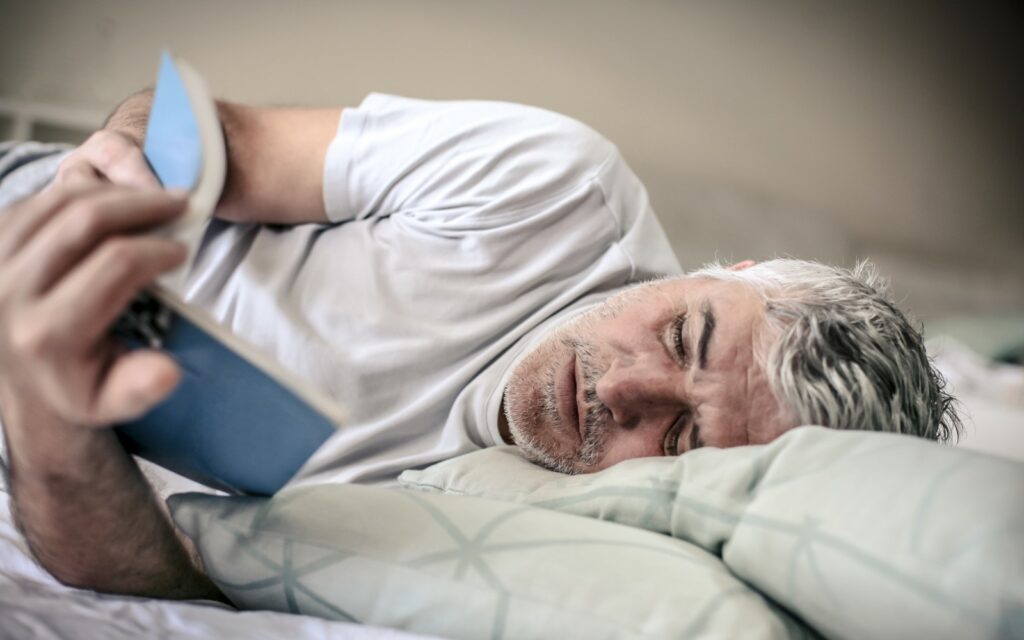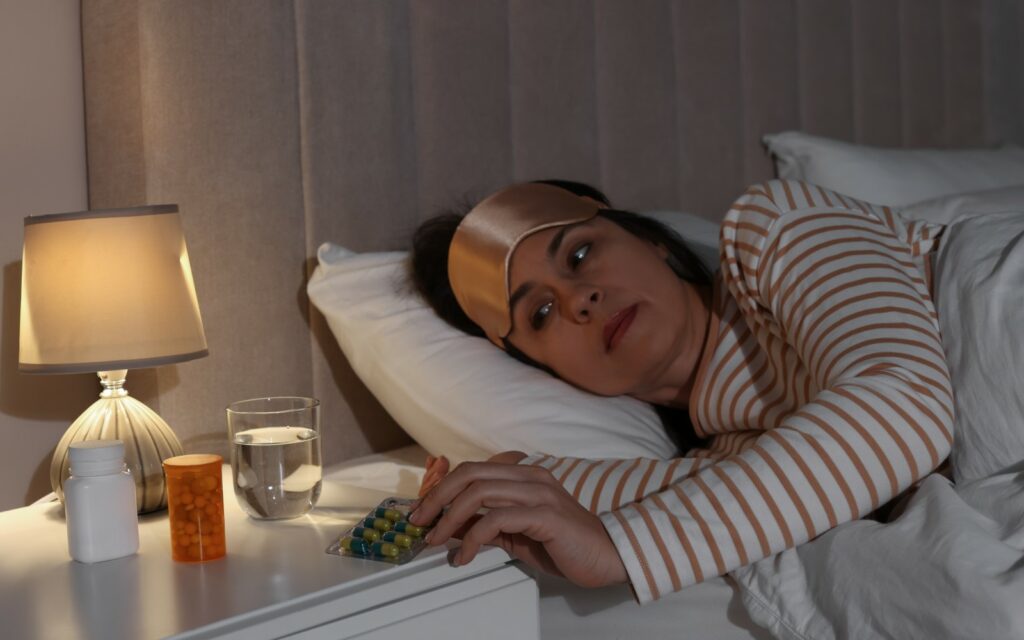
This article discusses the right ways to cope with Sleep Deprivation so that you can quickly return to optimal sleep for your best mood, performance, health and body composition.
1. Get Sun Exposure In Your Eyes

Lack of sleep can disrupt your natural circadian rhythm, which, in conjunction with your homeostatic sleep drive, regulates your nightly sleep patterns.
Sunlight is the most potent trigger for aligning our circadian rhythm and managing our daily sleep cycles. Aim to spend time outdoors and bask in natural sunlight, especially during the morning hours. If you’re short on time, you can still benefit from at least 5 minutes of sunlight exposure to your eyes while brushing and flossing your teeth.
Avoid direct eye contact with the sun; instead, observe its rays as they illuminate trees, the slope of a hill, or filter through clouds. Whenever feasible, aim to rise with the sun, even on cloudy mornings.
Standard household lighting lacks the intensity required to initiate the circadian rhythm. If you reside in a location where consistent access to morning sunlight is limited, such as Alaska, you might consider investing in a light therapy device.
2. Take A Short Nap Before 3 PM
Long naps can impair your sleep schedules by affecting sleep drive. Sleep drive regulates sleep intensity, and gets stronger every hour you are awake as adenosine builds up in the brain.
Extended naps can disrupt your sleep patterns by impacting your sleep drive. Sleep drive governs sleep depth and intensity and gets stronger every hour you are awake as adenosine builds up in the brain.
Our cells dismantle adenosine triphosphate (ATP) as a means to extract energy for their functions. As ATP is metabolized, a constituent called adenosine starts to accumulate in the brain, leading to the sensation of fatigue.
Consuming caffeine temporarily inhibits adenosine from binding to brain cells, which is why many of us opt for multiple cups of coffee during the day to enhance wakefulness.
Taking a brief nap and awakening before 3 pm allows adequate time for adenosine to accumulate naturally before your usual bedtime. However, if someone naps past 3 pm and wakes up just before dinner at 6 pm, they may need to wait until well past midnight for their body to accumulate sufficient adenosine to induce drowsiness and facilitate sleep.
An ideal midday nap of around 30 minutes can enhance learning and mood without interfering with your sleep drive. Remember that it typically takes about 10 to 15 minutes to doze off, so targeting a nap duration of 40 to 45 minutes is optimal. This approach also reduces sleep inertia, allowing you to awaken and function effectively afterward.
3. Keep A Consistent Sleep Schedule
Maintain a consistent bedtime and wake-up time every day, even on weekends. An irregular sleep schedule compels your body to expend energy on recuperating from sleep deprivation and adjusting hormones to a new circadian rhythm. A steady sleep routine mitigates this additional stress and permits the body to concentrate on revitalizing and mending the brain and body.
4. Find A Relaxing Routine Before Bed
For some people, this means:
• Reading a book
• Meditating
• Calming breathwork
• A warm bath
• Or listening to relaxing music
Engaging in a soothing routine can trigger your body’s parasympathetic nervous system, which is responsible for reducing heart rate and respiration, facilitating relaxation/rest and supporting the digestion and absorption of nutrients.

5. Dark, Cool, Comfortable Bedroom
These concepts become more understandable when viewed from the perspective of our hunter-gatherer ancestors. For them, the setting sun brought darkness, serving as a signal to their bodies that it was time to prepare for sleep.
Darkness plays a crucial role in triggering the brain’s production of melatonin. Additionally, as the sun sets, the temperature tends to drop a few degrees (varying by location) which served as another signal our ancestors’ bodies used to affirm that it was bedtime.
This is why falling asleep is more effortless in a cool room with a gentle ocean breeze compared to a hot, humid room near a swamp. A cozy bedroom serves as a reassuring signal to the body that it’s a secure and tranquil environment for restful sleep. Conversely, an uncomfortable bedroom introduces unwarranted stress to your body as it endeavours to recover from a long day.
6. Hydrogen-Rich Water
In one small study, sixteen men and women in their early and late 20’s were sleep deprived for 24 hours. Those who consumed hydrogen-rich water exhibited enhanced attention spans and outperformed those who consumed regular water. Hydrogen water appeared to offer similar or better benefits compared to caffeine, all without disrupting sleep or leading to subsequent withdrawal symptoms. Interestingly, hydrogen water even promoted an increase in deep sleep. [1]
How Long Does It Take To Fully Recover From A Night Of Sleep Deprivation Vs. Chronic Sleep Deprivation?

Numerous research studies provide insights into this question. In a small-scale investigation, 18 healthy individuals aged 46 to 55 were examined. They experienced either complete sleep deprivation for one night or only four hours of sleep per night for five consecutive days. Interestingly, after the last day of sleep restriction, these participants’ feelings of sleepiness and cognitive performance returned to baseline levels following just eight hours of recovery sleep. [2]
It’s worth emphasizing that the secretion of sleep-related hormones undergoes alterations with natural aging, and sleep duration often diminishes as we grow older. [3] Therefore, the results of this study might not be relevant to younger adults, who generally require more sleep.
In another research investigation, brain wave patterns were monitored in 12 healthy males aged 20 to 36 who experienced a consistent daily sleep duration of only 4 hours a day for a full week. It was observed that it took 12 days of regular sleep for their brain waves to return to baseline levels. This suggests that the body’s recovery mechanisms in response to sleep deprivation are gradual and intricate. [4]
It’s crucial to understand that relying solely on “catch-up sleep” may not be sufficient to completely avert or facilitate a comprehensive recovery from the effects of sleep deprivation over the course of a week. On a slight upside, “Catch-up sleep” has been associated with reduced adverse consequences of insufficient sleep, such as poor blood sugar control and all-cause mortality.” [5]
According to Dr. Matthew Walker– a professor of neuroscience and psychology at the University of California, Berkeley– after just one night of sleep restriction in adults, it would take four days for brain waves to return to normal.
In his book, Why We Sleep: The New Science Of Sleep And Dreams, he states that regardless of the amount of recovery opportunity we give ourselves after being sleep deprived, the brain never comes close to getting back all the sleep it has lost.
Dr. Walker emphasizes that, “[…] humans and all other species [that sleep] can never sleep back that which we have previously lost.” Especially when “Neither naps nor caffeine can salvage complex functions of the brain, including learning, memory, emotional stability, complex reasoning or decision making.”
Conclusion
I trust that this article has offered you valuable insights on how to effectively recuperate after extended work hours, late-night study sessions, or addressing unexpected late-night emergencies.
In summary:
• Avoid sleeping in or taking multi-hour naps
• Limit large meals, caffeine, and alcohol
• Exercise earlier in the day
• Remove distractions from the bedroom
• Avoid laying in bed awake for long periods of time
• Find your ideal sleep duration
• Expose your eyes and brain to natural sunlight
• Try supplements like Mental Reboot PM and hydrogen water instead of caffeine
• Optimize your sleep environment
References
1. Todorovic N, Zanini D, Stajer V, Korovljev D, Ostojic J, Ostojic SM. Hydrogen-rich water and caffeine for alertness and brain metabolism in sleep-deprived habitual coffee drinkers. Food Sci Nutr. 2021;9(9):5139-5145. doi:10.1002/fsn3.2480
2. Philip P, Sagaspe P, Prague M, et al. Acute versus chronic partial sleep deprivation in middle-aged people: differential effect on performance and sleepiness. Sleep. 2012;35(7):997-1002. doi:10.5665/sleep.1968)
3. Li J, Vitiello MV, Gooneratne NS. Sleep in normal aging. Sleep Med Clin. 2018;13(1):1-11. doi:10.1016/j.jsmc.2017.09.001
4. Kim JJ, Hwang IC. Weekend catch-up sleep is associated with reduced metabolic derangements in Korean adults. Neurol Sci. 2021;42(2):735-737. doi:10.1007/s10072-020-04805-8
5. St-Onge MP, Grandner MA, Brown D, et al. Sleep duration and quality: Impact on lifestyle behaviors and cardiometabolic health: A scientific statement from the American heart association. Circulation. 2016;134(18):e367-e386. doi:10.1161/CIR.0000000000000444


